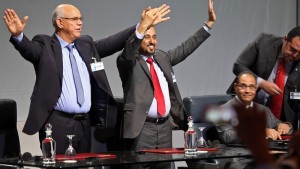By Libya Herald reporters.

Tunis, 17 December 2016:
The first anniversary of the signing of the Libyan Political Agreement has highlighted a change in the signals surrounding a deal which was once said to be non-negotiable.
A spokesman for UN Secretary-General Ban Ki-moon insisted today that much had been achieved in the last year including the Tripoli arrival of the Presidency Council, increased oil production and advances against terrorism. But failure to swiftly get on with putting the LPA into practice had done nothing for stability and security.
Ban’s representative in Libya, UNSMIL chief Martin Kobler added that he commended “the brave Libyan men and women” who were engaged in the LPA .
A more extensive critique of the process came from British ambassador Peter Millett. He recalled in a blog the euphoria, expectation and excitement of the LPA signing in the Moroccan resort of Skhirat. “There was a sense that the divisions and polarisation that had plagued Libya since the revolution were over. Now was the time to rebuild, restore and recover Libya’s dignity”.
He admitted that unfortunately these hopes had not been realised. Progress had been slow. Deadlines, such as the militias’ withdrawal from all urban areas within 30 days of a ceasefire and the HoR’s endorsement of a GNA within ten days, had been missed.
Millett echoed recent remark’s by UNSMIL’s Kobler that the LPA was not set in stone. “The details of the LPA are important, but not crucial” he wrote, “There is no such thing as an agreement that can garner the support of everyone. So don’t make the perfect the enemy of the good”.
He did not believe there was an alternative to the Libyan Political Agreement: “Of course another group of Libyans could start a negotiation, but it is highly unlikely that they would quickly reach a different agreement that would secure all-round acceptance and rapid delivery”.
Millett also rounded on those who have written off the deal. “Some people will no doubt claim today that the Skhirat Agreement has failed. Some will even claim that it has expired after one year. This is not correct. According to the LPA, it is the GNA that has a shelf life of one year from the vote of confidence; that particular clock hasn’t even started ticking yet”.
Millett was immediately taken to task by some social media critics who asked why, if the GNA did not yet officially exist, EU ambassadors had last month presented their credentials in Tripoli. However those ceremonies were between the European diplomats and Faiez Serraj as head of the UN-recognised Presidency Council. Diplomatic meetings with ministers-designate have taken place on the grounds that the PC has asked them to take up their portfolios on a caretaker basis, pending HoR approval of the cabinet. To date, Serraj and his PC colleagues have yet to submit a third government list to the internationally-recognised parliament in Tobruk.
Millett also pointed out that the LPA was only an interim, short-term step. In the long-term Libya needed a new constitution which depended on the Constitution Drafting Assembly elected from all parts of the country.
“Pending a final draft of the new constitution, Libya needs a government to unify the country” he said, “National unity is the most powerful weapon to confront the challenges the country is facing”.






